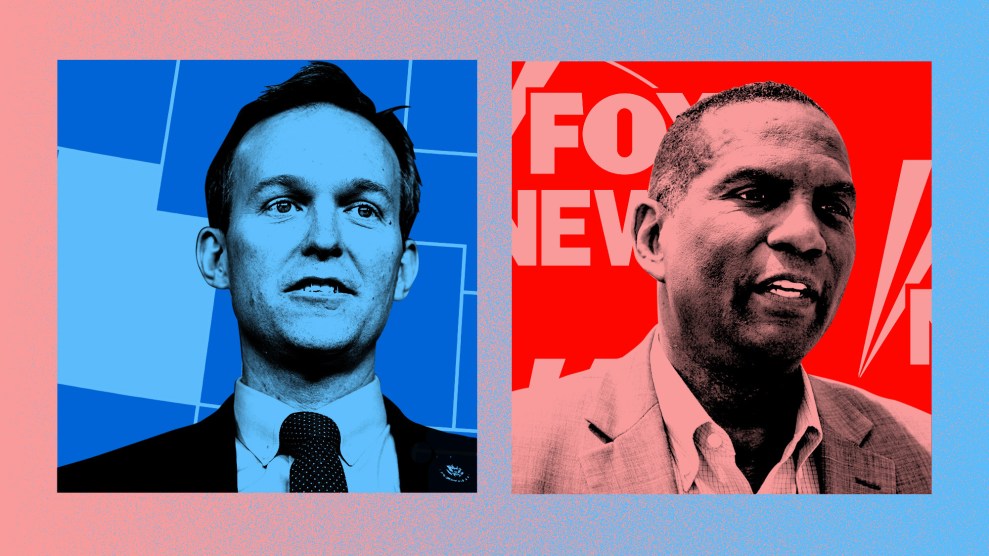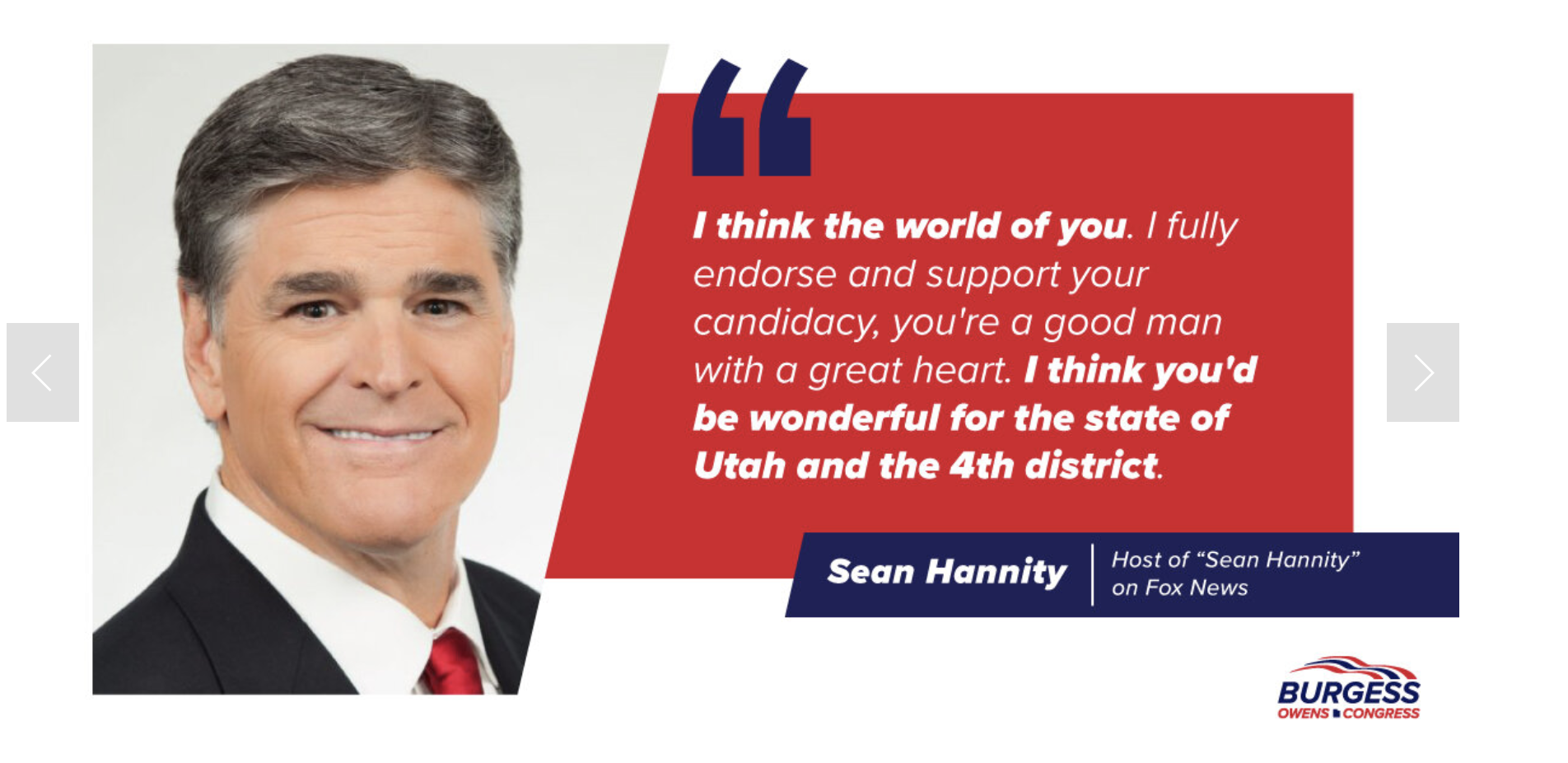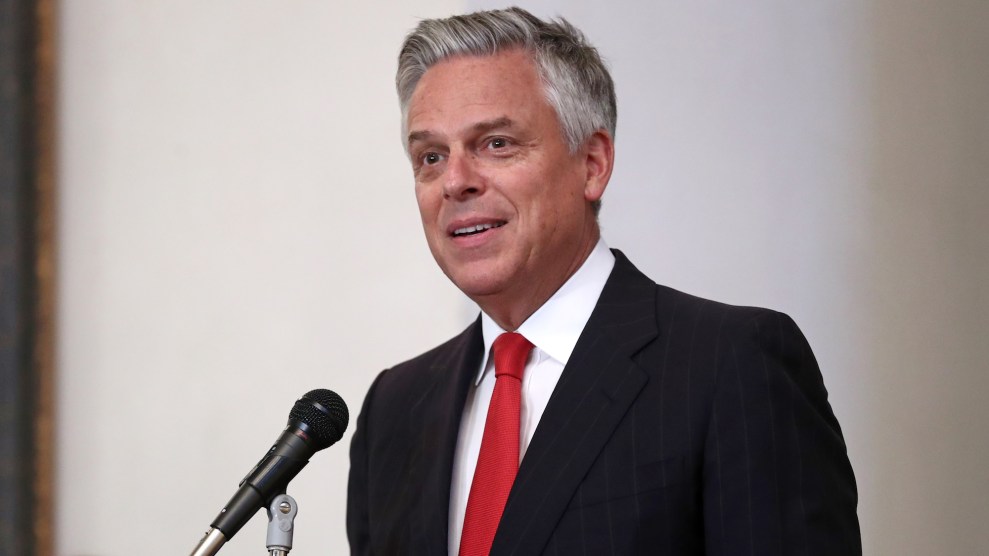
Mother Jones illustration; Bill Clark/CQ/ZUMA; burgess4utah
In mid-December, first-term Rep. Ben McAdams (D-Utah) was among the last House members to decide how to vote on the articles of impeachment against President Trump. It was a decision with potentially dire implications for the reelection efforts of the state’s only congressional Democrat, who represents a district gerrymandered to favor Republicans. McAdams defeated incumbent Rep. Mia Love (R) by fewer than 700 votes in 2018.
After he announced his decision to vote for impeachment, the Trump campaign went on the attack, blasting out a statement warning, “Voters won’t forget his cowardice. McAdams’ political career is over.” Outside groups poured money into ads denouncing him. His approval rating dropped 11 percent. And then on March 18, he announced that he had tested positive for the novel coronavirus and spent a week in the hospital recovering.
It seemed inevitable that come November, practically any Republican in this conservative district would easily defeat one of the most endangered Democrats in Congress. Instead, political analysts are cautiously predicting that McAdams will get reelected. Why? Because on June 30, Utah Republicans nominated former NFL player and Fox News commentator Burgess Owens to run against him. Owens might be a national figure, beloved on Fox and Friends as one of Trump’s few Black acolytes, but he is relatively unknown in Utah. His campaign illustrates many of the pitfalls of transforming the GOP into the party of Trump, where talking points come from Sean Hannity, the president can do no wrong, and everyone has forgotten Tip O’Neill’s famous adage that all politics is local.
“There is a deep tension between being a Fox News pundit and a Republican candidate in a close swing district,” says Chris Karpowitz, co-director of the Center for the Study of Elections and Democracy at Brigham Young University in Provo, Utah. “It’s also the larger dilemma that Republicans are facing right now: They’ve chosen to be the party of Donald Trump. What happens when the bottom falls out from Donald Trump’s popularity? Even in a very red place like Utah, there are limits to the attempt to align oneself with Donald Trump.”
The differences between the two candidates go far beyond party affiliation. While McAdams’ Utah roots go back seven generations, Owens has lived there less than a decade. He didn’t register to vote in Utah until 2014, and he doesn’t appear to own a house there. McAdams served in the state senate and was elected mayor of Salt Lake County twice. Owens has never been elected to anything, has been through two bankruptcies, and has failed to pay hundreds of thousands of dollars in taxes over the years. When Owens played in the Super Bowl, his crowning achievement, McAdams was in grade school. The one thing they have in common is that they’re both Mormons.
On TV and in campaign events, Owens froths about the liberal “enemy” bent on destroying the country and the president, describing all Democrats as Marxists and socialists. Meanwhile, McAdams is donating his plasma for coronavirus research and voting in Congress for more national park funding in a state that has five of them. The race has thrown November’s choices into sharp contrast and will be a test of whether a Fox News endorsement is enough to elect a Trump-supporting Republican in a swing district.
“We have a generic, nationalized campaign going on,” observes Tim Chambless, a political science professor at the University of Utah.
The impeachment vote “seems so six months ago,” McAdams mused on a sunny day in June as we sat in a park near his house in the Sugar House neighborhood of Salt Lake City. At 45, he still has the mild-mannered boyish appearance of the LDS missionary he once was. Two of his four school-age kids stopped by and said hello as we talked.
“My district will ultimately support Trump,” he told me. But he thinks Utah voters in the congressional race will “seek someone who will dial down the rhetoric. A lot of people are uncomfortable with [Trump’s] divisive style and want people who can bring some civility to politics.” McAdams seems nothing but civil and soft-spoken, qualities that post-impeachment may now have given him the highest approval ratings of any member of Utah’s congressional delegation. Salt Lake Tribune political columnist Robert Gehrke wrote recently that his inoffensiveness is “equaled only by white rice.”
McAdams’ reelection campaign has been helped by the GOP’s disarray—which is unusual given that Republicans hold every statewide office and 80 percent of the state legislative seats. “This should have been at the top of the Republicans’ wish list in terms of new pickups for 2020, but they seemed to struggle from the get-go,” says Karpowitz. “They couldn’t recruit more experienced candidates who would have made it a much more competitive race.”
Early frontrunner Utah Senate Majority Whip Dan Hemmert dropped out of the race in December, leaving a primary field crowded with B-listers. Delegates to the state nominating convention in April failed to coalesce around a single candidate, leaving McAdams without an obvious opponent until Owens won the June 30 GOP primary with 43 percent of the vote.
Now Owens is trying to introduce himself to the general electorate. Campaign materials highlight his football career—first-round draft pick for the New York Jets in 1973, a 1981 Super Bowl championship with the Oakland Raiders—and his Fox News appearances. He draws on a compelling personal story of growing up in segregated Tallahassee and speaks openly about his hard times. After 10 seasons with the NFL and a failed business venture, he was so strapped for cash that he lived in a basement apartment in Brooklyn with his wife and four kids under ten and supported his family with random jobs like working as a chimney sweep. Recovery came slowly, helped by a corporate job at the Utah-based WordPerfect and eventually a career as a motivational speaker.
Then there are the two bankruptcies, one in 1991 and again in 2001, and the thousands of dollars’ worth of tax liens he racked up in New York. He also once had more than $200,000 in unpaid federal taxes. His financial disclosure statement shows that he still owes the IRS $6,500.
Utah doesn’t figure much into the narrative. Owens apparently owns no property in the district, not to mention the state, he hopes to represent. The Utah address Owens lists in campaign finance documents and corporate records is for a house owned by an LLC controlled by one of his campaign donors, real estate developer William O. Perry III. (The Owens campaign did not respond to repeated requests for comment.) Owens’ daughter Summur-Rayn Berrett, a former flight attendant who is being paid by his campaign for media consulting, is also listed at that address in federal elections filings. Since 2015, Owens has registered a number of business entities in Utah, but most are now inactive.
Owens touts his work with the nonprofit he founded called Second Chance 4 Youth, in which he tries to help kids coming out of the juvenile justice system get back on their feet, but it wasn’t registered in Utah until June 2019. One of the group’s board members is Tyler Perry, William O. Perry’s son. In an interview, Tyler Perry says that Owens is a family friend who first met his father at an event at the Freedoms Foundation at Valley Forge, a Cold War-era civics group founded with support from President Dwight Eisenhower. Owens, who was living in Philadelphia at the time, spoke at the event. William O. Perry III was on the board, and the two hit it off.
When some of his children were attending Brigham Young University, Owens decided to move to Utah. Tyler Perry says they met about five years ago, and Owens later asked him to help with his nonprofit. “Burgess has a huge heart and everywhere he goes he wants to make a positive difference,” Perry says. “From my perspective he’s doing a great job of getting out and getting to know a lot of people. I would think it would be dang hard to come into a new place and put together what he’s put together.”
Nonetheless, Owens has some catching up to do. Everyone in Utah seems to know who McAdams is. In fact, Perry says some of his friends are close with McAdams and that his brother also knows him well. “Ben’s a good guy,” he says, highlighting the problem with the scorched earth campaign Owens seems to be running. In May, Owens told Matt Boyle on Breitbart News, “In the case of Ben McAdams, he is a nice guy, but he stands right there with Nancy Pelosi and Maxine Waters, [Adam] Schiff, and the other socialist-Marxists that are trying to take down our country,” apparently not realizing that McAdams voted against Pelosi for House Speaker. “I’m the person best positioned to beat Ben McAdams because I will call them what they are: they are bullies and cowards and socialist-Marxists, and I will let them know that we will not stand for it anymore.” As one anonymous Republican told UtahPolicy.com recently, “No one, except for a few very right-wing crazies, believes Ben McAdams is a Marxist.”
Born and raised in Utah, McAdams went to the University of Utah and Columbia Law School, where he met his wife, and practiced law in New York City before joining a Utah firm. He quickly headed into local government, working for former Salt Lake City mayor Ralph Becker, then serving two years in the Utah state senate before becoming a popular Salt Lake County mayor in 2012. During his six years as mayor, McAdams worked on bipartisan issues like homelessness with Utah establishment figures like his friend Josh Romney, one of Mitt’s five sons.
Once in Congress, McAdams focused on local issues, particularly his recent efforts to block Trump administration plans to restart nuclear weapons testing in Nevada. Nuclear testing is a subject that often transcends partisan politics in the state. In the 1950s and early ‘60s, the federal government knowingly exposed thousands of Utah residents—known as “downwinders”—to high levels of radiation from open-air testing in the Nevada desert. Many have died from radiation-related cancers, including the state’s last Democratic governor, Scott Matheson. (His son Jim Matheson was the last Democrat to hold the 4th District seat.) In the 1980s, former Utah Sen. Orrin Hatch (R) helped pass the Radiation Exposure Compensation Act, securing compensation for downwinders sickened by nuclear fallout.
McAdams has opposed Trump’s proposal and has successfully inserted language into a defense appropriation bill to block new testing. Owens, however, is a fan. On a local talk radio show in June, the host asked Owens if he supported Trump’s plan to restart nuclear testing. “Absolutely,” he responded. “I will be supporting our president because he supports our country. He loves our country. He does it for free. He just needs to have some backbone in the House and Senate to make this thing happen really right.” Later in the interview, Owens reiterated that “we should be loyal, period” to leaders who support God, family and country, as he thinks Trump does.
Such comments have raised eyebrows in Utah. Steve Erickson, a longtime Utah volunteer with Downwinders Inc., an advocacy group formed in the late 1970s, says sticking with Trump on the nuclear testing issue “could end up being a strategic mistake.”
How did someone with so few ties to Utah win the GOP primary in one of the nation’s most competitive congressional races? For that he can probably thank Fox News. Owens is a regular on the conservative news network and has appeared on shows like Fox and Friends to complain about NFL players taking a knee during the National Anthem. Dubbing himself the “the anti-Colin Kaepernick,” Owens testified before Congress last year to oppose reparations for the descendants of slaves, after penning an op-ed in the Wall Street Journal arguing, “I didn’t earn slavery reparations. I don’t want them.”

His campaign rhetoric is generic Fox News mixed with pro-football motivational jargon and locker room clichés. During the GOP primary debate in early June, he highlighted his “four tenets” —head, heart, hands and home—that guide him. But during the media scrum after the debate, Owens couldn’t answer a single question about what specifically he planned to do in Congress aside from fighting “the enemy” and “evil at the door,” also known as Democrats.
Owens has expanded on his political views in two books, which express some old-fashioned ideas about women. In Liberalism or How to Turn Good men into Whiners, Weenies and Wimps, he devotes an entire section to “chivalry,” which he believes liberalism has ruined by “blur[ing] the line between genders, thus facilitating and encouraging the demeaning of both.” For Owens, manhood has a “divine nature” that must be deployed “for the protection and care of womanhood.” (Perhaps not surprisingly, Owens is divorced.) He’s also ventured into the world of right-wing conspiracy theories. In May, he appeared on a QAnon Internet show—which claims a “deep state” cabal that runs a pedophile ring is plotting against Trump and his supporters— and asked for support and campaign contributions.
After he jumped into the Utah congressional race, Owens told the Deseret News that President Trump was “an advocate for Black Americans, Black kids getting educated, having a choice. I love the fact he’s all about having Black Americans having jobs.” Trump had “done more to help my community come out of the darkness than any president in my lifetime,” he insisted. His loyalty was rewarded. After Owens secured the GOP nomination Trump tweeted an endorsement:
Congratulations, @BurgessOwens, on your impressive primary victory! A Super Bowl Champion, Burgess knows how to WIN. Strong on Life, Military, Vets and the #2A, he will always fight for Utah. Burgess has my Complete and Total Endorsement! #UT04 https://t.co/UppUx24FXx
— Donald J. Trump (@realDonaldTrump) July 3, 2020
But Trump’s support for Owens may not translate into votes in November. Utah has a rather tortured relationship with Trump, who received the lowest percentage of votes in the state than any GOP presidential candidate since George H.W. Bush in 1992. Utah politicians were among the loudest voices denouncing Trump after the release of the “Access Hollywood” tape during the campaign, where Trump admitted to sexually assaulting women. Most of them eventually endorsed him, but for the first time in its history, the Deseret News, owned by the LDS church, weighed in on the election and called for Trump to resign from his campaign.
Utah Sen. Mitt Romney (R) was the only Republican senator to vote in favor of Trump’s impeachment and has said he won’t vote for him in November. More importantly, in 2016, Trump won only 39 percent of the voters in McAdams’ district; independent Evan McMullin pulled in another 20 percent. Trump’s approval rating among voters in the district is still just 39 percent, and some polling suggests Democratic nominee Joe Biden is leading Trump by five points there.
These numbers may not do much to help Owens knock off a popular incumbent who is headed into the race with a significant fundraising advantage. McAdams raised $3.4 million by the end of June, dwarfing the $766,000 Owens has raised. “The voters know him. They elected him [mayor] twice,” Chambless says. “In contrast, Burgess Owens is relatively unknown except those who watch Fox News.”
Back in the Salt Lake park, McAdams seemed relaxed and sanguine about the race. He talked about the plasma study he’s participating in, and, true to form, pointedly declined to say anything negative about Owens. “I take some comfort in telling myself the best way to get reelected is to do my job,” McAdams said. “This district doesn’t belong to the Democratic or Republican Party.”

















